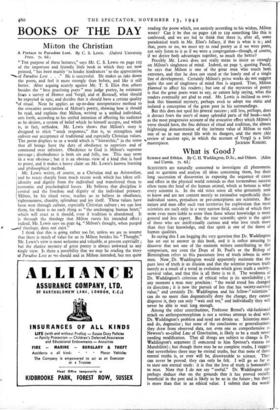BOOKS OF THE DAY
Milton the Christian
" THE purpose of these lecturts," says Mr. C. S. Lewis on page 125 of the important and friendly little book in which they are now printed, " has been mainly ` to hinder hindrances ' to the appreciation
'"of Paradise Lost . . ." He is successful. He makes us take down the poem, and feel it more strongly than before, and like it still better. After arguing acutely against Mr. T. S. Eliot that others besides the " best practising poets " may judge poetry, he estimates from a survey of Homer and Vergil, and of Beowulf, what should be expected in epic, and decides that it should have a certain quality of ritual. Next he applies an up-to-date interpretative method to the evocative associations of Milton's poetry, showing how it should be read, and explains that Milton, writing as a unified individual, sets forth, according to his settled intention of affecting his audience as he desires, a system of belief which he himself accepts, and which is, in fact, orthodox. Mr. Lewis shows that Milton's story is designed to elicit " stock responses," that is, to strengthen and enliven our acceptance of traditional and especially Christian values. The poem displays to us a world which is " hierarchic," in the sense that all beings have the duty of obedience to superiors and of command over inferiors. Obedience to God is Milton's supreme message ; disobedience is both sin and folly, too. This may seem in a way obvious ; but it is an obvious view of a kind that is hard to prove, and it makes a heavy claim on Mr. Lewis's known learning and philosophical method.
Mr. Lewis writes, of course, as a Christian and an Aristotelian, and he reacts sharply from much recent work which has taken self- identity and dignity from the individual and transferred them to economic and psychological forces. He believes that discipline is central and the freedom and dignity of the individual primary. Milton, by his ritual verse, teaches us to believe in obedience, righteousness, chastity, splendour and joy itself. These values have been won through culture, especially Christian culture ; we can lose them, for there is no such thing as "the unchanging human heart," which will react as it should, even if tradition is abandoned. It is through the theology that Milton exerts his intended effect ; indeed, Mr. Lewis says on page 64, " Milton's thought, when purged theology, does not exist."
I think that this is going rather too far, unless we are to assume that there is much of value for us in Milton besides his " Thought." Mr. Lewis's view is most welcome and valuable, at present especially ; but the elusive mystery of great poetry is always awkward to any single view. Is there a possibility that we may be reading the Story of Paradise Lost as we should and as Milton intended, but not quite reading the poem which, not entirely according to his wishes, Milton wrote? Can it be that on pages 126 to 129 something like this is confessed, and we are led to think that there is, after all, some paradoxical truth in Mr. Eliot's fallacy, if that is what it is ; and that, poets or no, we must try to read poetry as if we were poets, not only listen to it as if we were a congregation—though, of course, if we derive both advantages together, so much the better?
Possibly Mr. Lewis does not really mean to insist so strongly on Milton's singleness of mind. Indeed, on page 7, quoting Pascal, he says that Milton is one of the great men who touch both extremes, and that he does not stand at the lonely end of a single line of development. Certainly Milton's prose works do not suggest quite the sort of singleness of mind that is argued. True, Milton planned to affect his readers ; but one of the mysteries of poetry is that the great poets want to say, or cannot help saying, what the readers eventually are glad to read. Mr. Lewis is inclined to over- look this binomial mystery, perhaps even to adopt too static and isolated a conception of the great poet in his surroundings.
But this does not spoil his general success ; still less, perhaps, does it detract from the merit of many splendid parts of the book—such as the most progressive account of the evocative effect which Milton's verse should have, the fine defence of ritual and tradition, the almost frightening demonstration of the intimate value of Milton to each one of us in our moral life with its dangers, and the most eble review of ancient epic, in which the account of Vergil is a little


























 Previous page
Previous page